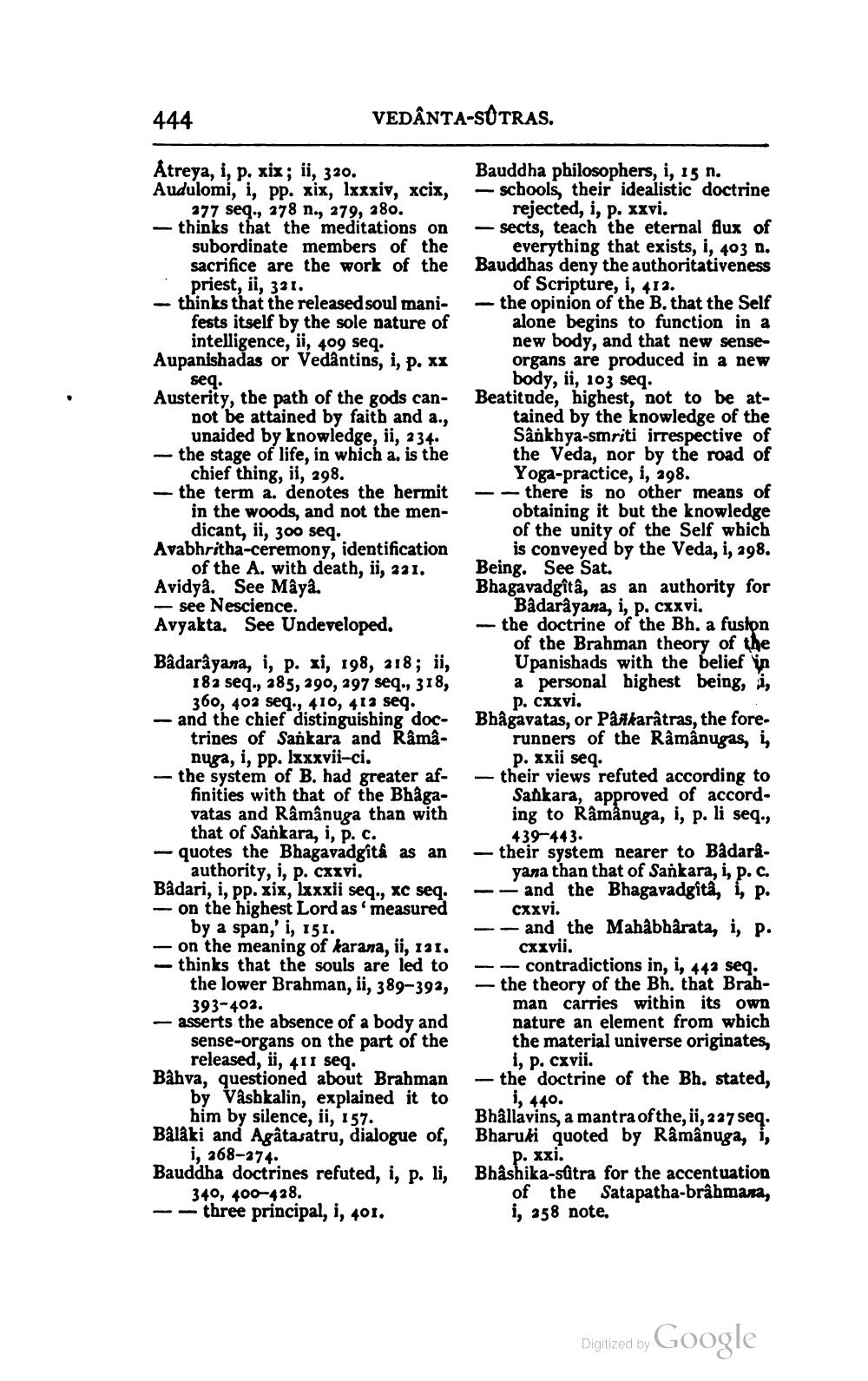________________
444
Atreya, i, p. xix; ii, 320. Audulomi, i, pp. xix, lxxxiv, xcix, 277 seq., 278 n., 279, 280. - thinks that the meditations on subordinate members of the sacrifice are the work of the priest, ii, 321.
- thinks that the released soul manifests itself by the sole nature of intelligence, ii, 409 seq. Aupanishadas or Vedântins, i, p. xx seq.
VEDANTA-SUTRAS.
Austerity, the path of the gods cannot be attained by faith and a., unaided by knowledge, ii, 234. -the stage of life, in which a. is the
chief thing, ii, 298. -the term a. denotes the hermit in the woods, and not the mendicant, ii, 300 seq. Avabhritha-ceremony, identification of the A. with death, ii, 221. Avidyâ. See Mâyâ. - see Nescience.
Avyakta. See Undeveloped.
Bâdarâyana, i, p. xi, 198, 218; ii, 182 seq., 285, 290, 297 seq., 318, 360, 402 seq., 410, 412 seq. - and the chief distinguishing doctrines of Sankara and Râmânuga, i, pp. lxxxvii-ci.
-the system of B. had greater affinities with that of the Bhagavatas and Râmânuga than with that of Sankara, i, p. c. -quotes the Bhagavadgitâ as an authority, i, p. cxxvi.
Bâdari, i, pp. xix, lxxxii seq., xc seq. - on the highest Lord as 'measured by a span,' i, 151.
- on the meaning of karana, ii, 121. -thinks that the souls are led to the lower Brahman, ii, 389-392, 393-402.
- asserts the absence of a body and sense-organs on the part of the released, ii, 411 seq. Bâhva, questioned about Brahman by Vashkalin, explained it to him by silence, ii, 157. Bâlâki and Agâtasatru, dialogue of,
i, 268-274. Bauddha doctrines refuted, i, p. li, 340, 400-428.
three principal, i, 401.
——
Bauddha philosophers, i, 15 n. -schools, their idealistic doctrine rejected, i, p. xxvi.
-sects, teach the eternal flux of everything that exists, i, 403 n. Bauddhas deny the authoritativeness of Scripture, i, 412.
-the opinion of the B. that the Self alone begins to function in a new body, and that new senseorgans are produced in a new body, ii, 103 seq. Beatitude, highest, not to be attained by the knowledge of the Sânkhya-smriti irrespective of the Veda, nor by the road of Yoga-practice, i, 298.
- there is no other means of obtaining it but the knowledge of the unity of the Self which is conveyed by the Veda, i, 298. Being. See Sat. Bhagavadgitâ, as an authority for Bâdarayana, i, p. cxxvi.
1
- the doctrine of the Bh. a fusion of the Brahman theory of the Upanishads with the belief in a personal highest being, i, p. cxxvi.
Bhagavatas, or Pânkarâtras, the forerunners of the Râmânugas, i, p. xxii seq.
- their views refuted according to Sankara, approved of according to Râmânuga, i, p. li seq.,
439-443.
- their system nearer to Bâdarâyana than that of Sankara, i, p. c. and the Bhagavadgitâ, i, p.
cxxvi.
- and the Mahabharata, i, p. cxxvii.
contradictions in, i, 442 seq. -the theory of the Bh. that Brahman carries within its own nature an element from which the material universe originates, i, p. cxvii.
-the doctrine of the Bh. stated, i, 440.
Bhâllavins, a mantra of the, ii, 227 seq. Bharuki quoted by Râmânuga, i,
P. xxi.
Bhâshika-sûtra for the accentuation of the Satapatha-brâhmaлa, i, 258 note,
Digitized by Google




